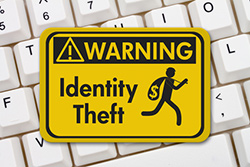With the Internet, modern society is connected now more than ever. While this interconnectedness may make some things easier, less savory things, such as identity theft, seem to have become easier as well. Identity theft is a crime that affects millions* of people. It can take months to years, as well as thousands and thousands of dollars, to undo the damage that it could cause. Knowing how identity theft happens could help you better understand what information you need to protect and how you can avoid becoming a victim.1. How thieves get your personal and financial information
Identity thieves can access your information in a myriad of ways, such as:
2. Your online presence can hurt you Over sharing or not making your social media accounts private enough may leave you vulnerable to identity theft. Just by looking through your social media accounts, a hacker may be able to identify your full name, home address, birthdate, and phone number. Armed with this simple information, criminals may be able to apply for credit cards or medical insurance, open a bank account, or even sign up for a driver’s license under your name. Along with your social media accounts, the fingerprints you leave behind while online can be very risky in terms of identity theft. For example, logging on to a public and unprotected Wi-Fi can leave you vulnerable to hackers, who can then use the Internet connection to glean all kinds of private information from your laptop, tablet, or phone. If you do use a public Wi-Fi connection, be careful about what information you send and receive. You should also check the web address and make sure that the name in the address bar matches the name of the establishment offering the service. Using a VPN to connect to public Wi-Fi can help minimize risks, as well. 3. You need to protect your kids and elders, too Adults aren’t the only targets for identity theft. Criminals have been known to steal the identity of children, especially because many parents or caregivers do not think to check their child’s credit history. Thieves can get away with stealing a minor’s identity for years because kids won’t typically access their credit history until they start taking steps toward establishing a financial record, such as applying for school loans, ID cards, or credit cards. To help protect their child’s identity, parents should request their child’s credit report each year. The elderly are also targets for scammers as they may be vulnerable, lonely, and trust others with their information easily. Because these individuals grew up without the Internet, they may not understand what they need to do to help protect their identity. Caregivers should help older adults keep track of their financial information and teach them how to spot a scam, whether online or over the phone. 4. How you can avoid becoming a victim Identity theft can happen to anyone, but by staying aware and protective of your personal information, you can reduce your chances of becoming a victim. One important thing you can do is destroy personal documents that you no longer need, such as bank statements and credit card statements, by shredding them before disposing of them. When it comes to your online accounts, carefully screen what you share and remove identifying information such as geotags from photos. You should also make sure all your online passwords are unique and hard-to-copy, using a mix of symbols, capital letters, and numbers to make it difficult for hackers to use them to access your accounts. You should also monitor all of your financial accounts weekly and report any discrepancies immediately. 5. Identity theft is hard to detect and harder to repair Even if you are very careful, criminals may still be able to access your information and steal your identity. Many individuals do not have the time or the resources to work toward restoring their identity on their own if it is stolen, which is why enlisting in an identity protection service is important. While technology changes constantly adapts to new threats, hackers and scammers adapt too, which makes protecting against identity theft a constant challenge. Playing offense against hackers by helping to protect your personal information online is important, but to fully safeguard your identity, you need some defense as well. You could also use security software on your devices, such as Norton Security to shield your computer and devices from malware and viruses and to help protect your online identity from cybercriminals. Identity theft occurs offline too. That’s why in addition to a robust security suite it helps if you have an identity protection service. Such services can help protect your personal information by sending you alerts if suspicious activity is identified on any of your financial accounts, or if new accounts are opened with your Social Security number. LifeLock is one such robust service. The unique combination of Norton Security and LifeLock is the fortification that gives you the peace of mind to confidently move forward in the online and offline world. These are just a few of the precautions one can take to help protect against identity theft. Keeping yourself aware of all the threats that can affect you is the first step towards a digitally safe life. These are just a few of the precautions one can take to help protect against identity theft. Keeping yourself aware of all the threats that can affect you is the first step towards a digitally safe life. Avoiding identity theft is easier than cleaning it up later. Give us a call to make sure you’re doing all you can to prevent it.
|

